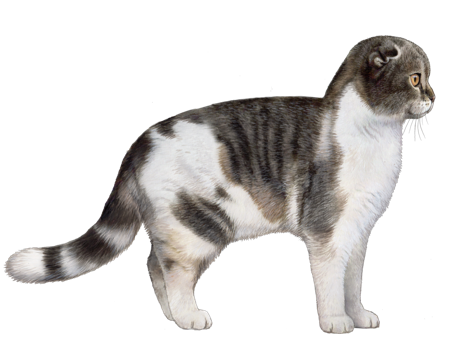
British Shorthair
The British Shorthair is an intelligent breed with a calm, easygoing nature. These cats are slightly reserved and independent. But they're also affectionate and devoted to their people. Such qualities make them undemanding companions and terrific family pets.
Interested in discovering if your cat is a British Shorthair?
Check out Wisdom Panel's DNA test.
British Shorthair Traits
General Appearance
The British Shorthair is a medium-to-large cat with a round head and chubby cheeks. They have compact, well-balanced bodies and—though they may be many colors—are most associated with the original blue coat.
Coat and Coloring
British Shorthairs have a very dense, plush coat with a firm texture. They come in more than thirty different coat colors and patterns, including solid, tabby, parti-color, and shaded.
Distinctive Physical Traits
A massive, round head and round face are defining features of the British Shorthair. They also have medium-size ears that are wide at the base and rounded at the tips. The color of their large, round eyes varies based on their coat color. British Shorthairs have thick necks, broad chests, and powerful bodies. Completing their feature set are short, strong legs, round, firm paws, and a medium-length tail that tapers slightly to a rounded point.
British Shorthair Temperament
Easygoing and friendly toward other pets and kids, British Shorthairs are great family cats. Plus, their reserved and independent nature makes them calm companions that don't need constant attention—they're more than capable of entertaining themselves.
British Shorthairs form tight bonds with their people and are very affectionate. That said, they typically don't enjoy being carried (that would be undignified) and may not make the best lap cats.
In terms of energy level, this breed isn't overly athletic or hyper. Still, British Shorthairs do like to have fun. Favorite pastimes include playing with their humans and sometimes stalking toy mice to prove their innate hunting skills are still intact.
British Shorthair History
British Shorthairs are likely the oldest English cat breed. Historians believe their ancestors were ancient domestic cats that the Romans brought to Great Britain when they invaded the country.
The earliest British Shorthairs were street cats in England. They were well known for their keen rodent hunting skills and likely inspired the Cheshire Cat character in Alice in Wonderland. Still, they didn't receive formal recognition until 1871, when they participated in the first cat show in London's Crystal Palace. As these cats became better known, breeders began crossing them with Persians. This introduced the longhair gene into the breed line (and eventually led to the development of the British Longhair).
British Shorthairs were quite successful in early cat shows. But both world wars affected available breeding stock. And by the mid-1900s, British Shorthairs were in short supply. Breeders began crossing the remaining cats with other domestic shorthairs to preserve the breed. And as their numbers grew, so did their popularity. The International Cat Association granted the British Shorthair championship status in 1979, to be followed by the Cat Fanciers Association in 1980.
British Shorthair Care
Nutrition
British Shorthairs require a high-quality diet. Because nutritional needs vary for kittens, adults, and senior cats, be sure to choose a formula that's age-appropriate for your pet.
British Shorthairs aren't overly active. So, they typically don't need as many calories as other cats their size. To maintain a healthy body condition, monitor their food intake and reduce their portions if they start to gain weight. Take care with the number of treats you give them, too. As a guideline, treats should make up no more than 10% of a cat's daily calories.
Besides feeding daily meals, remember to make fresh, clean water available at all times.
Grooming
British Shorthairs are excellent at grooming themselves, so baths generally aren't needed. However, their thick coats need weekly brushing with a steel comb to remove loose hair. During periods of seasonal shedding, you may need to brush more frequently.
Routine nail clipping can help prevent your cat's nails from snagging on something or growing into their paw pads—leading to pain or infection. In addition to clipping, providing a scratching post will help keep their nails in good shape and satisfy their instinct to scratch.
Dental hygiene is another essential component of every cat's care. The sooner you start yours on a routine that includes at-home teeth brushing, the better. They should also regularly see a veterinarian for exams and professional cleanings.
Health
Roughly one out of every three cats in the United States is overweight or obese. And those extra pounds can contribute to other health risks—such as arthritis, diabetes, and heart problems. Consult your veterinarian if you're worried your cat might be overweight.
British Shorthair Genetic Health Conditions
-
Autoimmune Lymphoproliferative Syndrome (Discovered in British Shorthair)
Autoimmune Lymphoproliferative Syndrome is a disease of the immune system which can cause the lymph nodes to become severely enlarged.
-
Familial Episodic Hypokalemic Polymyopathy (Discovered in the Burmese)
Familial Episodic Hypokalemic Polymyopathy causes episodes of muscle weakness and pain.
With more than 45 health tests, Wisdom Panel™ Complete for Cats screens for these and other important genetic conditions—allowing you to better plan for your cat's lifelong care.
Breed Group
Persian
An ever-popular variety, the breeds within this group tend to share a common genetic connection with Persian cats.
Resources
https://cfa.org/british-shorthair/
https://www.tica.org/breeds/browse-all-breeds?view=article&id=829:british-shorthair-breed&catid=79
https://cfa.org/british-shorthair/british-shorthair-article-2002/
https://vcahospitals.com/know-your-pet/cat-breeds/british-shorthair
https://cfa.org/british-shorthair/british-shorthair-article-1995/
https://www.banfield.com/state-of-pet-health/obesity
Reviewed February 23, 2021 by Laura Inman, DVM






